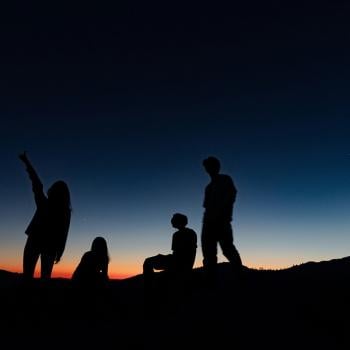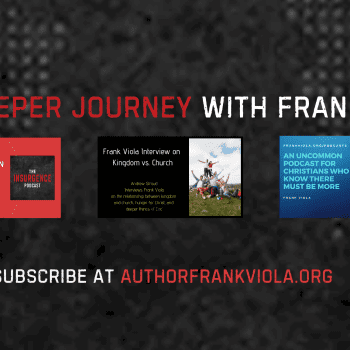There are two further issues that should be addressed. The first is whether there is something in Christian doctrine that tends to make Christians ecologically irresponsible. Even those Christians who have written most ardently about the goodness of creation recognized that it is not ultimate, and many of them have used expressions that do denigrate the world around us. Julian of Norwich, immediately after speaking of God as creator, protector, and lover of all that God has made, writes: "God wishes to be known, and it pleases him that we should rest in him; for everything which is beneath him is not sufficient for us. And this is the reason why no soul is at rest until it has despised as nothing all things which are created."
This is the kind of language that led Karl Marx to speak of religion as "the opium of the people," people yearning for "pie in the sky by and by" while despising material reality. A related criticism is that the Christian tradition in particular is largely responsible for the exploitation of nature, as famously argued by Professor Lynn White, Jr. in an often-anthologized article first published in 1967. White claimed that "in Antiquity every tree, every spring, every stream, every hill had its own genius loci, its guardian spirit.... Before one cut a tree, mined a mountain, or dammed a brook, it was important to placate the spirit in charge of that particular situation, and to keep it placated. By destroying pagan animism, Christianity made it possible to exploit nature in a mood of indifference to the feelings of natural objects" ("The Historical Roots of Our Ecologic Crisis," Science 155 [10 March 1967]:1203-07).
Still others have asserted that when God, in the first chapter of Genesis, tells humans to "fill the earth and subdue it; and have dominion over the fish of the sea and over the birds of the air and over every living thing that moves upon the earth" (Genesis 1:28), this command gives us carte blanche to treat the world around us in any way that seems to be for our benefit.
What are we to make of such charges? First, there has unquestionably been a world-denying quality in many expressions of Christian spirituality, though this is so much less the case today that some feel the pendulum has swung too far in the opposite direction. With regard to Professor White's main point, it is crucial to recognize that if the Judeo-Christian tradition rejected the notion that every natural object had its own genius loci, there is a real sense in which Judaism and Christianity are themselves animistic.
When the 104th Psalm says that God's spirit "renews the face of the earth" (v. 30) and the Book of Wisdom affirms that "the spirit of the Lord has filled the world" (1:7), this implies that the multifarious guardian spirits of ancient animism have given way to a single, omnipresent Spirit abiding in every creature. It was this awareness that led a mystic like the Jesuit scientist Pierre Teilhard de Chardin to pray to God in the following words: "Blazing Spirit, Fire, personal, super-substantial,... be pleased yet once again to come down and breathe a soul into the newly formed, fragile film of matter with which this day the world is to be freshly clothed" ("The Mass on the World," in Hymn of the Universe, p. 22).
Moreover, Teilhard and many others, including St. Francis of Assisi, the patron saint of ecologists, have sensed the kinship that humans have with all other creatures, a kinship that led Francis to speak of Brother Sun and Sister Moon, Brother Wolf and Sister Water, even as contemporary science has shown us that we share our DNA, to one degree or another, with every living being on earth.
As Jürgen Moltmann writes in his book God in Creation, "If the Holy Spirit is poured out on the whole creation, then [the Spirit] creates the community of all created things with God and with each other, making it that fellowship of creation in which all created things communicate with one another and with God, each in its own way" (p. 11). In the simplest terms, this means that we humans are not above nature but are part of nature and that Christians, no less than Buddhists, can rightly speak of a certain interdependence of everything on earth.
Some have indeed interpreted the biblical charge to "subdue" the earth and "have dominion" over other creatures in a way that justifies exploitation, but the contemporary environmental crisis surely stems primarily either from human greed or the direst need and not from some scriptural text. After all, there are regions on earth that have suffered tremendous environmental devastation and yet have scarcely been touched by the Judeo-Christian tradition. Our call as human beings, regardless of our particular religious tradition, is to be responsible stewards, mindful of our kinship with other creatures and of our responsibility to care for them and for the earth itself with a love that reflects what we Christians believe to be God's own love for all creation. The practical challenge is to allow this awareness to influence the way we actually live on our fragile planet.




